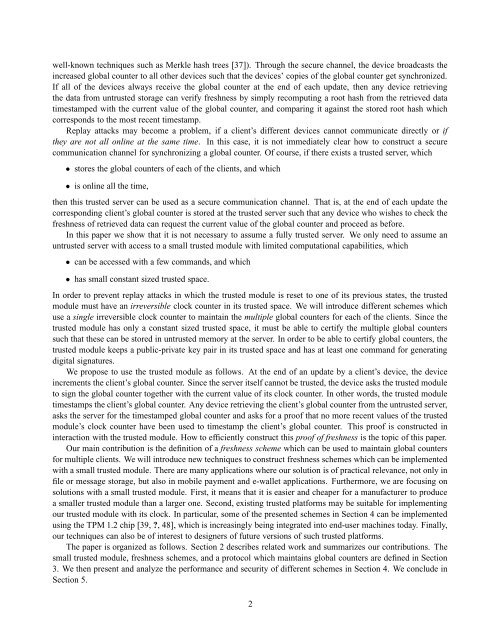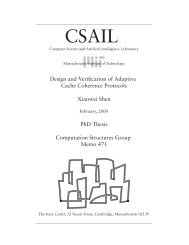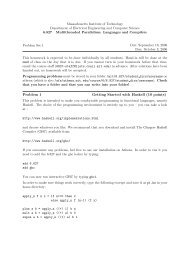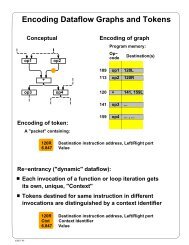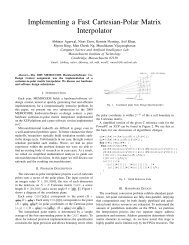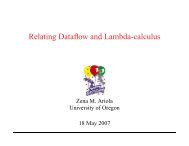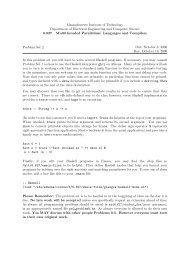Proof of Freshness - Computation Structures Group - MIT
Proof of Freshness - Computation Structures Group - MIT
Proof of Freshness - Computation Structures Group - MIT
Create successful ePaper yourself
Turn your PDF publications into a flip-book with our unique Google optimized e-Paper software.
well-known techniques such as Merkle hash trees [37]). Through the secure channel, the device broadcasts the<br />
increased global counter to all other devices such that the devices’ copies <strong>of</strong> the global counter get synchronized.<br />
If all <strong>of</strong> the devices always receive the global counter at the end <strong>of</strong> each update, then any device retrieving<br />
the data from untrusted storage can verify freshness by simply recomputing a root hash from the retrieved data<br />
timestamped with the current value <strong>of</strong> the global counter, and comparing it against the stored root hash which<br />
corresponds to the most recent timestamp.<br />
Replay attacks may become a problem, if a client’s different devices cannot communicate directly or if<br />
they are not all online at the same time. In this case, it is not immediately clear how to construct a secure<br />
communication channel for synchronizing a global counter. Of course, if there exists a trusted server, which<br />
• stores the global counters <strong>of</strong> each <strong>of</strong> the clients, and which<br />
• is online all the time,<br />
then this trusted server can be used as a secure communication channel. That is, at the end <strong>of</strong> each update the<br />
corresponding client’s global counter is stored at the trusted server such that any device who wishes to check the<br />
freshness <strong>of</strong> retrieved data can request the current value <strong>of</strong> the global counter and proceed as before.<br />
In this paper we show that it is not necessary to assume a fully trusted server. We only need to assume an<br />
untrusted server with access to a small trusted module with limited computational capabilities, which<br />
• can be accessed with a few commands, and which<br />
• has small constant sized trusted space.<br />
In order to prevent replay attacks in which the trusted module is reset to one <strong>of</strong> its previous states, the trusted<br />
module must have an irreversible clock counter in its trusted space. We will introduce different schemes which<br />
use a single irreversible clock counter to maintain the multiple global counters for each <strong>of</strong> the clients. Since the<br />
trusted module has only a constant sized trusted space, it must be able to certify the multiple global counters<br />
such that these can be stored in untrusted memory at the server. In order to be able to certify global counters, the<br />
trusted module keeps a public-private key pair in its trusted space and has at least one command for generating<br />
digital signatures.<br />
We propose to use the trusted module as follows. At the end <strong>of</strong> an update by a client’s device, the device<br />
increments the client’s global counter. Since the server itself cannot be trusted, the device asks the trusted module<br />
to sign the global counter together with the current value <strong>of</strong> its clock counter. In other words, the trusted module<br />
timestamps the client’s global counter. Any device retrieving the client’s global counter from the untrusted server,<br />
asks the server for the timestamped global counter and asks for a pro<strong>of</strong> that no more recent values <strong>of</strong> the trusted<br />
module’s clock counter have been used to timestamp the client’s global counter. This pro<strong>of</strong> is constructed in<br />
interaction with the trusted module. How to efficiently construct this pro<strong>of</strong> <strong>of</strong> freshness is the topic <strong>of</strong> this paper.<br />
Our main contribution is the definition <strong>of</strong> a freshness scheme which can be used to maintain global counters<br />
for multiple clients. We will introduce new techniques to construct freshness schemes which can be implemented<br />
with a small trusted module. There are many applications where our solution is <strong>of</strong> practical relevance, not only in<br />
file or message storage, but also in mobile payment and e-wallet applications. Furthermore, we are focusing on<br />
solutions with a small trusted module. First, it means that it is easier and cheaper for a manufacturer to produce<br />
a smaller trusted module than a larger one. Second, existing trusted platforms may be suitable for implementing<br />
our trusted module with its clock. In particular, some <strong>of</strong> the presented schemes in Section 4 can be implemented<br />
using the TPM 1.2 chip [39, ?, 48], which is increasingly being integrated into end-user machines today. Finally,<br />
our techniques can also be <strong>of</strong> interest to designers <strong>of</strong> future versions <strong>of</strong> such trusted platforms.<br />
The paper is organized as follows. Section 2 describes related work and summarizes our contributions. The<br />
small trusted module, freshness schemes, and a protocol which maintains global counters are defined in Section<br />
3. We then present and analyze the performance and security <strong>of</strong> different schemes in Section 4. We conclude in<br />
Section 5.<br />
2


